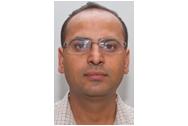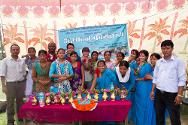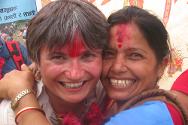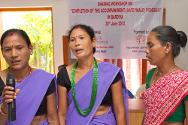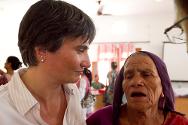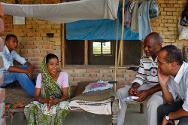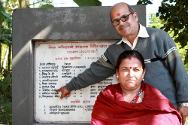Nepal: families of missing persons receive psychosocial support
29-08-2012 Interview
Nepal’s 10-year internal conflict ended in 2006, but well over 1000 people are still missing. In 2010, the ICRC launched "Hateymalo," which means “join hands together.” The Hateymalo programme helps families of missing persons cope with the ambiguity of their loss by giving them psychological, socio-cultural, economic, and legal/administrative support. Project leader Yubaraj Adhikari explains.
What is psychosocial support?
Psychosocial support is about helping the survivors of a disaster or crisis to resume their regular lives. It emphasizes the connection between our psychological needs related to our experiences (our thoughts, emotions and behaviour) on the one hand and our wider social experience (our relationships, interactions with others, integration within a community, tradition and culture) on the other.
Why was it important to launch this programme in Nepal?
No other organization was trying to alleviate the psychosocial suffering that families of missing persons endure. The ICRC knows how complex their needs are, because we have been working in this field for many years, not only in Nepal but all over the world.
How is the programme implemented and what are the perspectives?
Helping families in a diverse sociocultural context is not easy. We’re running Hateymalo in partnership with local NGOs familiar with the situation. Their role is mainly to facilitate activities. In turn, the various activities are aimed at alleviating psychological suffering, economic hardship, stigma and discrimination, and helping people surmount administrative and legal obstacles.
In addition, partner organizations have set up a solidarity network and have pooled their resources. This solidarity network has enabled over 700 families of missing persons in 16 districts to obtain support so far, and the ICRC plans to expand the programme to cover another 25 districts by 2013, reaching 550 more families.
What is a solidarity network and why is it needed?
The families of missing persons face a whole range of widely disparate problems; socio-cultural, economic, legal, mental health, and so on. No single organization can cover all these topics, however resourceful it may be. The only way to help the families effectively is to channel the resources of multiple agencies. Hateymalo has therefore established an extensive network of local and national agencies to support the families.
The solidarity network consists of Heifer International, the Helvetas Employment Fund, CTEVT – Skills for Employment Project, the Center for Mental Health and Counselling, the Mental Hospital, Lagankhel (Kathmandu) and Sahakarmi Samaj (Banke).
